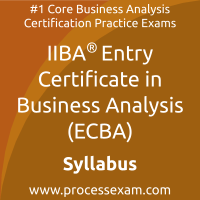 To achieve the professional designation of IIBA Entry Certificate in Business Analysis from the IIBA, candidates must clear the ECBA Exam with the minimum cut-off score. For those who wish to pass the IIBA Business Analysis Entry certification exam with good percentage, please take a look at the following reference document detailing what should be included in IIBA Business Analysis Entry Certificate Exam preparation.
To achieve the professional designation of IIBA Entry Certificate in Business Analysis from the IIBA, candidates must clear the ECBA Exam with the minimum cut-off score. For those who wish to pass the IIBA Business Analysis Entry certification exam with good percentage, please take a look at the following reference document detailing what should be included in IIBA Business Analysis Entry Certificate Exam preparation.
The IIBA ECBA Exam Summary, BABOK Guide, Sample Question Bank and Practice Exam provide the basis for the real IIBA Entry Certificate in Business Analysis (ECBA) exam. We have designed these resources to help you get ready to take IIBA Entry Certificate in Business Analysis (ECBA) exam. If you have made the decision to become a certified professional, we suggest you take authorized training and prepare with our online premium IIBA Business Analysis Entry Practice Exam to achieve the best result.
IIBA ECBA Exam Summary:
| Exam Name | IIBA Entry Certificate in Business Analysis |
| Exam Code | ECBA |
| Exam Fee | $395 |
| Exam Duration | 75 Minutes |
| Number of Questions | 50 |
| Passing Score | 70% |
| Format | Multiple Choice Questions |
| Books / Trainings | ECBA Master Class |
| Schedule Exam | PROMETRIC |
| Sample Questions | IIBA Business Analysis Entry Certificate Exam Sample Questions and Answers |
| Practice Exam | IIBA Entry Certificate in Business Analysis (ECBA) Practice Test |
IIBA Business Analysis Entry Syllabus Topics:
| Topic | Details | Weight |
|---|---|---|
| Understanding Business Analysis |
- Define business analysis, describe its role in enabling change, and outline key activities across contexts.
- Describe the six BACCM concepts, explain how they relate, and use them to support structured thinking. - Explain how business analysis supports value creation and benefits organizations in various industries. - Define value in business analysis and explain how outcomes are assessed to support value realization. |
20% |
| Mindset for Effective Business Analysis |
- Explain how mindset influences your effectiveness and identify ways to adopt an empowering mindset.
- Recognize the shared values that drive work and explain how those values support the work to be done.
- Identify core business analysis principles and apply them to guide your work and improve outcomes.
- Recognize foundational competencies and assess when to apply them in your work.
|
14%
|
| Implementing Business Analysis |
- Identify roles that perform business analysis and describe how responsibilities vary across contexts.
- Compare business analysis approaches and explain how to choose an approach based on the situation. - Identify organizational considerations that influence your work and explain their potential impact. - Describe the difference between requirements and designs and explain how they evolve throughout the initiative. |
6% |
| Change |
- Recognize how key organizational, environmental, and stakeholder factors can influence your work.
- Describe processes and systems to identify areas impacted by changes, and evaluate the impacts. - Track progress toward goals and support teams in adapting to changes, under direction. - Suggest and help implement simple improvements, working within clear guidelines. |
10%
|
| Need |
- Use basic elicitation methods and build positive rapport with stakeholders to elicit information.
- Document requirements clearly and collaborate with stakeholders to validate needs, under guidance. - Compare stakeholder needs with outcomes to check alignment and flag conflicts for review. - Support stakeholders in prioritizing needs, considering business value and urgency. |
10% |
| Solution |
- Explain basic solution validation concepts and record findings.
- Assist in evaluating solution options, considering feasibility and risks, and contribute to preparing recommendations. - Support defining scope and collaborate on planning and monitoring implementation activities. - Support preparation and updating of design artifacts to maintain clarity. |
10% |
| Stakeholder |
- Communicate with stakeholders using tailored messages to maintain engagement.
- Identify stakeholder roles and interests, and support analysis of their impact. - Facilitate stakeholder collaboration and feedback throughout the initiative. - Identify key stakeholder motivations, drivers, and concerns to understand their decisions. |
10% |
| Value |
- Confirm understanding of desired outcomes aligned with business objectives. - Support identification of value opportunities and help address barriers to delivery. - Describe how solutions meet business goals and relay information effectively for stakeholders. - Support defining key performance indicators (KPIs) aligned with value to measure success. |
10% |
| Context |
- Assist in validating information quality and alignment to your situation, and document those validation outcomes. - Support recognizing constraints and adapt plans to maintain alignment. - Assist in analyzing technology trends and support technology integration. - Apply relevant industry standards and frameworks to guide the work to be done. |
10% |
Both IIBA and veterans who’ve earned multiple certifications maintain that the best preparation for a IIBA ECBA professional certification exam is practical experience, hands-on training and practice exam. This is the most effective way to gain in-depth understanding of IIBA Business Analysis Entry Certificate concepts. When you understand techniques, it helps you retain IIBA Business Analysis Entry knowledge and recall that when needed.
